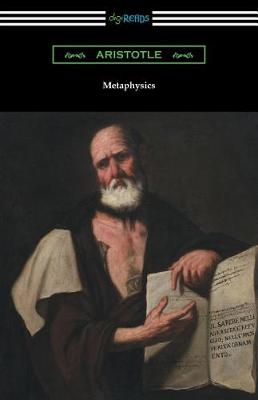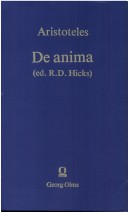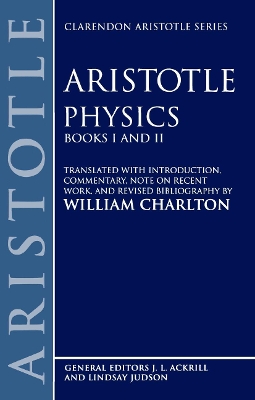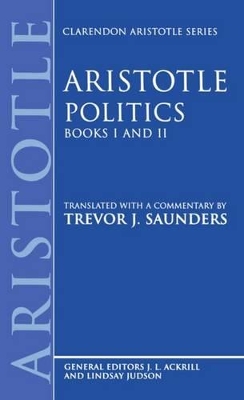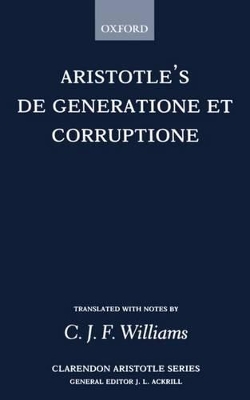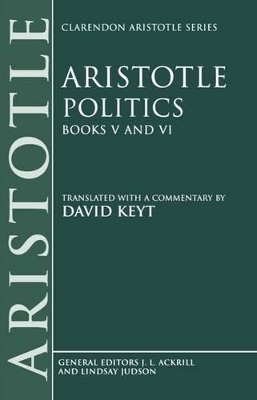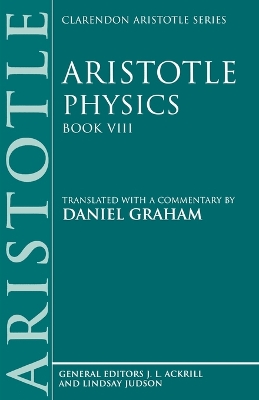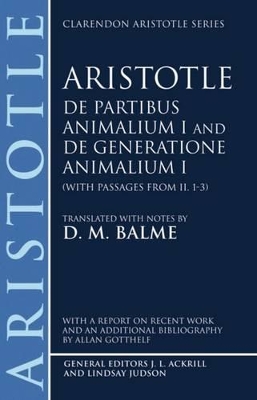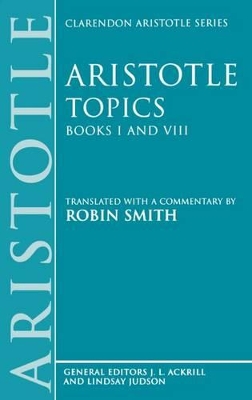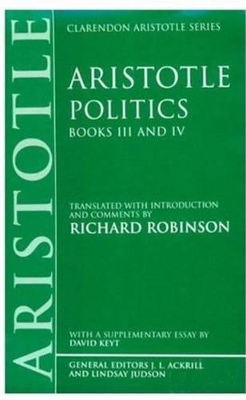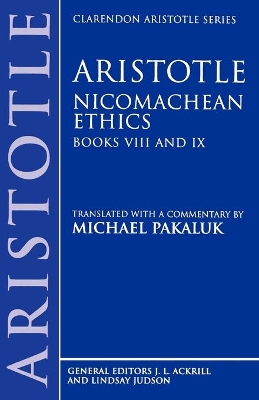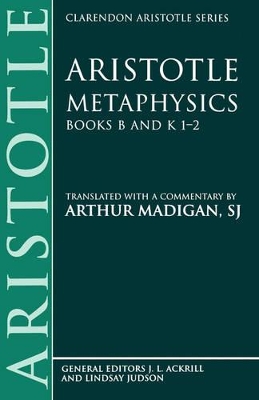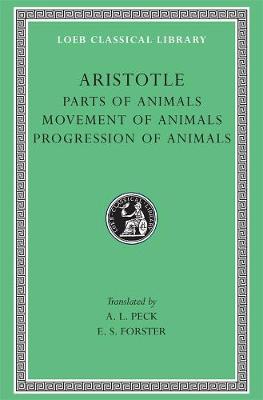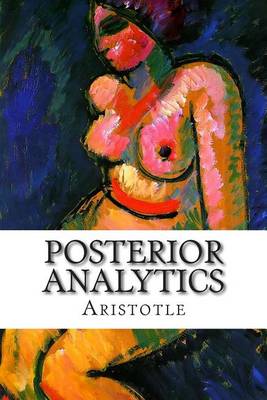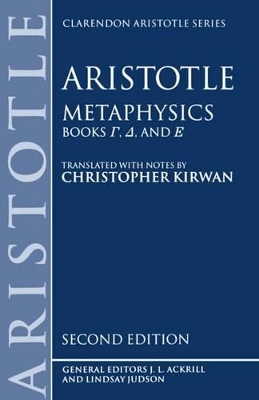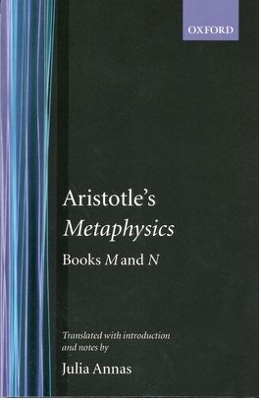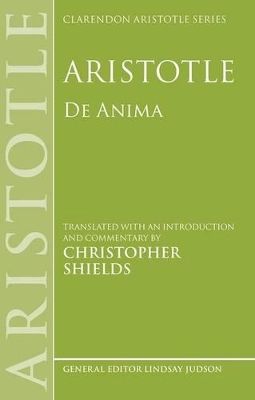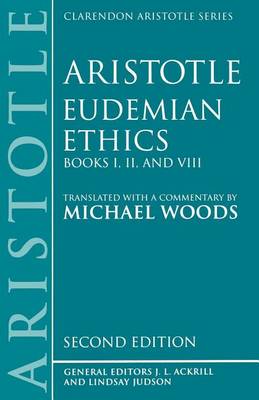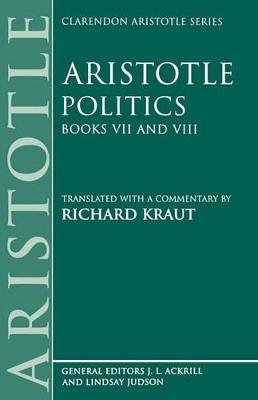Clarendon Aristotle
24 total works
The present volume provides a close literal translation, which can be used by serious students without Greek. The introduction and commentary deal with the interpretation and assessment, from a philosophical standpoint, of what Aristotle says.
This translation was first published in 1970.
Aristotle's Politics is a key document in Western political thought; it raises and discusses many theoretical and practical political issues which are still debated today. This edition is well suited to the requirements of students, including those who do not know Greek.
today—revolution and reform, democracy and tyranny, freedom and equality.
David Keyt presents a clear and accurate new translation of these books, together with a commentary which, though primarily philosophical, also supplies a key to Aristotle's many historical references. It is intended to guide readers towards a proper understanding of this classic text in the history of political thought, and does not assumes knowledge of Greek or of ancient history and politics.
Daniel Graham offers a clear, accurate new translation of this key text in the history of Western thought, and accompanies the translation with a careful philosophical commentary to guide the reader towards an understanding of the wealth of important and influential arguments and ideas that Aristotle puts forward.
De Partibus Animalium I and De Generatione Animalium I (with passages from Book II. 1-3)
by Aristotle
interpret Aristotle's arguments and discuss his views on major issues such as natural teleology.
The original edition was published in 1972.
This volume contains a clear and accurate translation of Books I and VIII of Aristotle's Topics together with a philosophical commentary on these books and additional selections from Books II and III, and from the Sophistical Refutations. These books and selections best give a general view of the main ideas, arguments, and techniques expounded in the Topics. The volume is well suited to the requirements of students, including those who do not know Greek.
Richard Robinson's volume was the first to be published in the Clarendon Aristotle Series, and it remains a model of its kind - a lucid and provocative Introduction, an accurate but readable translation, and concise and critical notes.
For this reissue, David Keyt has written a Supplementary Essay, in which he surveys and develops some recent ideas on the main themes of Politics III and IV. He also provides an up-to-date bibliography.
the remarkably coherent structure of the books and unfolds with lucidity the various arguments contained within Aristotle's terse and compressed text. Pakaluk looks at the logical form of Aristotle's analysis of friendship, at his subtle view of the relationship between friendship and justice, at the role of
reciprocity in friendship, at civic friendship and its relation to the family, and at the development of friendship out of self-love and reflexive consciousness. This volume will be a valuable tool for anyone studying Aristotle's ethics, especially readers with no Greek.
earlier philosophers, especially Plato and some of the Presocratics. These texts serve as a useful introduction both to Aristotle's own work on metaphysics and to classical metaphysics in general; they are also a good example of Aristotle's dialectical method, which reasons not from known truths but from reputable
opinions.
Parts of Animals. Movement of Animals. Progression of Animals
by Aristotle
Aristotle, great Greek philosopher, researcher, reasoner, and writer, born at Stagirus in 384 BCE, was the son of Nicomachus, a physician, and Phaestis. He studied under Plato at Athens and taught there (367-47); subsequently he spent three years at the court of a former pupil, Hermeias, in Asia Minor and at this time married Pythias, one of Hermeias's relations. After some time at Mitylene, in 343-2 he was appointed by King Philip of Macedon to be tutor of his teen-aged son Alexander. After Philip's death in 336, Aristotle became head of his own school (of "Peripatetics"), the Lyceum at Athens. Because of anti-Macedonian feeling there after Alexander's death in 323, he withdrew to Chalcis in Euboea, where he died in 322.Nearly all the works Aristotle prepared for publication are lost; the priceless ones extant are lecture-materials, notes, and memoranda (some are spurious). They can be categorized as follows:I. Practical: Nicomachean Ethics; Great Ethics (Magna Moralia); Eudemian Ethics; Politics; Oeconomica (on the good of the family); Virtues and Vices.
II. Logical: Categories; On Interpretation; Analytics (Prior and Posterior); On Sophistical Refutations; Topica.
III. Physical: Twenty-six works (some suspect) including astronomy, generation and destruction, the senses, memory, sleep, dreams, life, facts about animals, etc.
IV. Metaphysics: on being as being.
V. On Art: Art of Rhetoric and Poetics.
VI. Other works including the Athenian Constitution; more works also of doubtful authorship.
VII. Fragments of various works such as dialogues on philosophy and literature; and of treatises on rhetoric, politics and metaphysics.The Loeb Classical Library (R) edition of Aristotle is in twenty-three volumes.
Aristotle, great Greek philosopher, researcher, reasoner, and writer, born at Stagirus in 384 BCE, was the son of Nicomachus, a physician, and Phaestis. He studied under Plato at Athens and taught there (367-47); subsequently he spent three years at the court of a former pupil, Hermeias, in Asia Minor and at this time married Pythias, one of Hermeias's relations. After some time at Mitylene, in 343-2 he was appointed by King Philip of Macedon to be tutor of his teen-aged son Alexander. After Philip's death in 336, Aristotle became head of his own school (of "Peripatetics"), the Lyceum at Athens. Because of anti-Macedonian feeling there after Alexander's death in 323, he withdrew to Chalcis in Euboea, where he died in 322.Nearly all the works Aristotle prepared for publication are lost; the priceless ones extant are lecture-materials, notes, and memoranda (some are spurious). They can be categorized as follows: I. Practical: Nicomachean Ethics; Great Ethics (Magna Moralia); Eudemian Ethics; Politics; Oeconomica (on the good of the family); Virtues and Vices.
II. Logical: Categories; On Interpretation; Analytics (Prior and Posterior); On Sophistical Refutations; Topica.
III. Physical: Twenty-six works (some suspect) including astronomy, generation and destruction, the senses, memory, sleep, dreams, life, facts about animals, etc.
IV. Metaphysics on being as being.
V. On Art: Art of Rhetoric and Poetics.
VI. Other works including the Athenian Constitution; more works also of doubtful authorship.
VII. Fragments of various works such as dialogues on philosophy and literature; and of treatises on rhetoric, politics and metaphysics.The Loeb Classical Library(R) edition of Aristotle is in twenty-three volumes.
`accident', unity, truth, cause, and other such concepts. The translation is very close to the Greek, as an aid to students who cannot check the English version against the original. It is followed by an interpretative and critical commentary.
For this new edition Mr Kirwan has added a substantial section of further comment on several central issues, and considerably expanded the bibliography.
This paperback edition replaces the outstandingly successful hardback.
'Dr Annas's translation is clear, readable, and accurate...an enjoyable volume, stimulating both as intellectual history and as philosophical argument.' Times Literary Supplement
The Eudemian Ethics is a major treatise on moral philosophy whose central concern is what makes life worth living. Aristotle considers the role of happiness, and what happiness consists of, and he analyses various factors that contribute to it: human agency, the relation between action and virtue, and the concept of virtue itself. Moral and intellectual virtues are classified and considered, and finally the roles of friendship and pleasure. It deals with the same issues as the
better-known Nicomachean Ethics, with which it holds three books in common, and its special qualities, as well as the similarities and differences between the two works, are of fundamental concern to anyone interested in Aristotle's philosophy.
This is the first time the Eudemian Ethics has been published in its entirety in any modern language. Anthony Kenny's fine translation is accompanied by a lucid introduction and explanatory notes, which assist the reader in understanding this important work.
ABOUT THE SERIES: For over 100 years Oxford World's Classics has made available the widest range of literature from around the globe. Each affordable volume reflects Oxford's commitment to scholarship, providing the most accurate text plus a wealth of other valuable features, including expert introductions by leading authorities, helpful notes to clarify the text, up-to-date bibliographies for further study, and much more.
Christopher Shields presents a new translation and commentary of Aristotle's De Anima, a work of interest to philosophers at all levels, as well as psychologists and students interested in the nature of life and living systems. The volume provides a full translation of the complete work, together with a comprehensive commentary. While sensitive to philological and textual matters, the commentary addresses itself to the philosophical reader who wishes to understand and assess
Aristotle's accounts of the soul and body; perception; thinking; action; and the character of living systems. It aims to present controversial aspects of the text in a neutral, fair-minded manner, so that readers can come to be equipped to form their own judgments. This volume includes the crucial first book, which the
original translation in the Clarendon Aristotles Series omitted.
philosophical commentary on these books from a contemporary point of view. Like the other volumes in the series, it is intended to serve the needs of readers of Aristotle without a knowledge of Greek, and the aim in the translation has been to give as accurate an idea as possible of Aristotle's text; but for the benefit of
those who are able to read the original there are notes on the Greek text used for problematic passages. In preparing this new edition Michael Woods has made use of the much improved text of the Eudemian Ethics that has recently been published as an Oxford Classical Text, and has taken into consideration recent philosophical work on Aristotle's ethics.
The Clarendon Aristotle Series is designed for both students and professionals. It provides accurate translations of selected Aristotelian texts, accompanied by incisive commentaries which focus on philosophical problems and issues. The volumes in the series have been widely welcomed and favourably reviewed. Important new titles are being added to the series, and a number of well-established volumes are being reissued with revisions and/or supplementary material.
This volume contains a clear and accurate translation of the last two books of Aristotle's Politics, together with a philosophical commentary. It is well suited to the requirements of students, including those who do not know Greek.
The Politics is a key document in Western political thought; it raises and discusses many theoretical and practical political issues which are still debated today. In Books VII and VIII Aristotle gives his fullest picture of the ideal civic community, as a model for actual political systems. In such a community citizens share equally in political deliberation by drawing on a common conception of the good, and all are educated by the city to participate in its culture. Aristotle's
discussion ranges over such issues as commerce, property, marriage, abortion, censorship, education, and the place of music and poetry in civic life.
